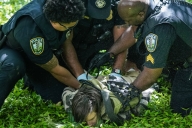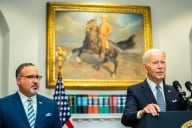You have /5 articles left.
Sign up for a free account or log in.
The death of Justice Antonin Scalia has set off a debate at the Georgetown University law school about the appearance of institutional endorsements and intellectual diversity.
Some professors are criticizing the law school for a statement on Scalia's death that they say ignores parts of his record with which many disagree. These professors shared their views in emails to all students and faculty members. And their sharing of their criticism of Scalia in that way has other professors saying that their positive views of Scalia are being denigrated and that students are thus being discouraged from expressing certain conservative or libertarian opinions.
The various emails are all being published online, adding to the debate.
The controversy started when the law school and the university issued press releases about Scalia, who received his undergraduate degree from Georgetown and who made a number of visits to the law school over the years, meeting with students and faculty members.
The law school's news release had the headline "Georgetown Law Mourns the Loss of U.S. Supreme Court Justice Antonin Scalia." The release quoted the law dean, William M. Treanor, as saying, "Scalia was a giant in the history of the law, a brilliant jurist whose opinions and scholarship profoundly transformed the law."
That prompted Gary Peller, a law professor, to share his concerns about the press release.
"I was put off by the invocation of the 'Georgetown community' in the press release that Dean Treanor issued Saturday. I imagine many other faculty, students and staff, particularly people of color, women and sexual minorities, cringed at headline and at the unmitigated praise with which the press release described a jurist that many of us believe was a defender of privilege, oppression and bigotry, one whose intellectual positions were not brilliant but simplistic and formalistic," wrote Peller.
He added, "I am not suggesting that J. Scalia should have been criticized on the day of his death, nor that the 'community' should not be thankful for his willingness to meet with our students. But he was not a legal figure to be lionized or emulated by our students. He bullied lawyers, trafficked in personal humiliation of advocates and openly sided with the party of intolerance in the 'culture wars' he often invoked. In my mind, he was not a 'giant' in any good sense." (The full email may be found toward the bottom of this link.)
He added that he objected to the use of "Georgetown community" in the press release. He wrote that he feels part of "a lived community of tolerance, affection and care that so many have built for so long here. That 'community' would never have claimed that our entire community mourns the loss of J. Scalia, nor contributed to his mystification without regard for the harm and hurt he inflicted. That community teaches critique, not deference, and empowerment, not obsequiousness."
While differing views of Scalia are not surprising at a law school, much of the debate as it has grown has focused on the appropriateness of offering certain kinds of criticism, either in the immediate aftermath of the death of someone many view as a hero, or through mass emails to students and faculty members.
Two other Georgetown law professors -- Randy Barnett and Nick Rosenkranz -- sent out their own mass email. They said that they viewed Peller's as inappropriate under law school rules, and that they had obtained permission to send theirs in response.
They argued that the Peller email had a damaging impact on free exchange at the law school. They said that Peller's email insulted and scared students who are fans of Scalia by saying "in effect, your hero was a stupid bigot and we are not sad that he is dead."
Barnett and Rosenkranz continued, "Although this email was upsetting to us, we could only imagine what it was like for these students. Some of them are twenty-two-year-old 1Ls, less than six months into their legal education. But we did not have to wait long to find out. Leaders of the Federalist Society chapter and of the student Republicans reached out to us to tell us how traumatized, hurt, shaken and angry were their fellow students. Of particular concern to them were the students who are in Professor Peller’s class who must now attend class knowing of his contempt for Justice Scalia and his admirers, including them. How are they now to participate freely in class? What reasoning would be deemed acceptable on their exams?"
They closed their email, which is available here, by saying, "Sadly, as just two professors on a faculty of 125, we are in no position to offer much reassurance to our students, beyond reporting that we have heard on the faculty email list, and privately, from a few of our Georgetown colleagues who objected to these messages. All we can do, really, is convey our solidarity with our wonderful students. We share your pain. We share your anger. We stand with you. You are not alone. Be strong as Justice Scalia was strong. Remember, he heard far worse about himself than we have, and yet never wavered in both his convictions and his joy for life. But make no mistake: civil discourse at Georgetown has suffered a grievous blow. It is a time for mourning indeed."








